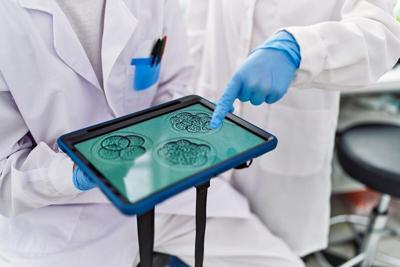Key Takeaways
Oregon researchers used human skin cells to create lab-grown eggs
The cells showed abnormalities, however
Scientists say the method could take a decade or more to be ready for human use
FRIDAY, Oct. 3, 2025 (HealthDay News) — Oregon scientists have taken an early step toward creating lab-grown eggs using human skin cells, but the process faces major challenges before it could ever be used to help people have children.
In the new study, published Sept. 30 in the journal Nature Communications, researchers at Oregon Health & Science University (OHSU) replaced the nucleus of a human egg with one from a skin cell, hoping to create a fertilizable egg.
The resulting cells had chromosome abnormalities, however, meaning they would not develop healthy embryos.
“We kind of developed this new cell division that can reduce chromosome number,” senior study author Shoukhrat Mitalipov, director of the OHSU Center for Embryonic Cell and Gene Therapy in Portland, told The Associated Press.
“It’s still not good enough to make embryos or eggs genetically normal,” he added.
To perform the experiment, scientists replaced the nucleus from an egg cell with one from a human skin cell. Because skin cells have two sets of chromosomes while eggs only have one, researchers had to trigger a process to force the cell to get rid of the extra set. They then fertilized the egg-like cells with donated sperm.
About 9% survived for six days in the lab, long enough to reach the blastocyst stage, an early stage of embryo development, The Associated Press said.
Mitalipov called the results an early “proof of concept” but said much more research is needed. He estimated it could take a decade or more before the technology could be tested in people.
Outside experts offered mixed reactions, however.
Columbia University stem cell researcher Dietrich Egli was concerned about the chromosome problems. But reproductive endocrinologist Dr. Eve Feinberg of Northwestern Medicine called the results “an important step and very exciting,” The AP said, though she agreed that fixing the genetic issues will be critical.
More information
There’s more about assisted reproductive techniques at the National Institutes of Health.
SOURCE: The Associated Press, Sept. 30, 2025
What This Means For You
Experts say the method is still highly experimental and not ready for use in humans.





















(0) comments
Welcome to the discussion.
Log In
Keep it Clean. Please avoid obscene, vulgar, lewd, racist or sexually-oriented language.
PLEASE TURN OFF YOUR CAPS LOCK.
Don't Threaten. Threats of harming another person will not be tolerated.
Be Truthful. Don't knowingly lie about anyone or anything.
Be Nice. No racism, sexism or any sort of -ism that is degrading to another person.
Be Proactive. Use the 'Report' link on each comment to let us know of abusive posts.
Share with Us. We'd love to hear eyewitness accounts, the history behind an article.